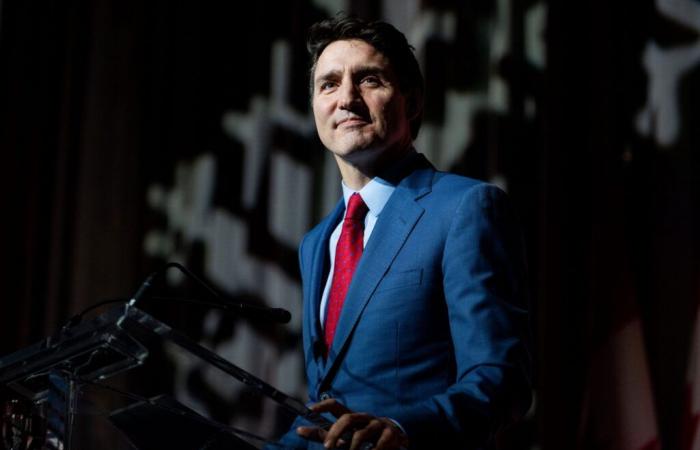The week that begins Monday could mark a decisive moment on the federal political scene, since, according to the daily newspaper “The Globe and Mail”, Prime Minister Justin Trudeau could announce that he is leaving his post as Liberal leader by Wednesday .
According to three sources who spoke anonymously to the Globe and Mail, Mr. Trudeau is expected to make an announcement regarding his political future by Wednesday, the day a Liberal caucus meeting is scheduled. He could therefore announce his resignation Monday or Tuesday, but the sources of the “Globe and Mail” were unable to specify the exact moment.
The Canadian Press has not independently confirmed the Globe and Mail’s information. The Globe’s sources were granted anonymity because they were not authorized to discuss the matter publicly.
More and more Liberal MPs are publicly calling for Mr. Trudeau’s departure, as polls continue to place the Liberals far behind the Conservatives ahead of the next federal election, which must take place no later than the fall.
This weekend, the MP for London North Centre, Peter Fragiskatos, in turn asked Mr. Trudeau to leave. In an interview with the London Free Press, he argued that his voters were now overwhelmingly in favor of the Prime Minister’s resignation.
On December 29, a letter from the Atlantic Liberal caucus calling on Mr. Trudeau to resign as party leader was shared publicly by New Brunswick MP Wayne Long, who has been saying since the fall that Mr. Trudeau should resign.
On Sunday, returning to Ottawa after a holiday vacation in British Columbia, Mr. Trudeau suggested he was sticking to his usual routine, despite Liberal MPs calling on him to resign and that the three main opposition parties have all said they plan to overthrow the government at the first opportunity.
In a post on X, Mr. Trudeau argued that the Liberal government had reduced child care costs for nearly a million Canadians. “In 2025, we will continue on this momentum,” he wrote on Sunday afternoon. According to the Prime Minister’s official schedule, Mr. Trudeau is scheduled to participate in a virtual meeting of the cabinet committee responsible for Canada-U.S. relations on Monday.
A meeting of the Liberal caucus on Wednesday
Federal MPs were not expected to return to Ottawa before the start of the House of Commons on January 27. Liberal elected officials were, however, encouraged to attend the caucus meeting scheduled for Wednesday in person.
In a letter, published online by CBC News, National Liberal Caucus Chair Brenda Shanahan said that due to the short notice for the meeting, MPs will be allowed to attend virtually, but will be expected of them that they are alone in a closed confidential space, their face visible at all times on the screen.
Pressure on Mr. Trudeau to resign intensified after the surprise resignation of Finance Minister Chrystia Freeland on December 16.
Before the holiday break, Natural Resources Minister Jonathan Wilkinson told The Canadian Press that Mr. Trudeau would take time to think about his future. Mr. Trudeau himself, however, has remained silent on this subject since Ms. Freeland’s resignation.
Several options for the future
That means the next few weeks in Ottawa could go several ways.
If Mr. Trudeau resigns, a provision in the constitution states that the Liberal caucus can be consulted on who will become interim leader.
Mike Crawley, who served as Liberal Party president for one term starting in 2012, noted the first decision to make would be whether to appoint an interim leader. Mr. Crawley clarified that he does not speak for the Liberal Party.
-He explained that the decision would be up to the party’s board of directors, but that, “in practice, the board would certainly take into consideration a recommendation coming from the caucus.”
The party leadership must call a meeting within 27 days to establish the rules for a leadership contest. Mr Crawley believes such a meeting would likely be called “much quicker than that”.
The constitution contains no rules dictating the length of a leadership contest, although candidates must collect the necessary signatures and submit a written nomination letter to the party president at least 90 days before the vote.
Mr. Crawley noted that the current situation, in which the minority Liberal government could fall at any time, adds to the complexity of a possible leadership race.
“I envy neither the current president of the party nor the board of directors who have to consider these options, because it is difficult,” he admitted.
The specter of a motion of censure
While it is not up to the party to decide whether the government will fall, it must decide “what is best for the party in terms of the leadership race, but at the same time I think it must also consider the emergency measures he is putting in place to ensure that in the event of the fall of the government, there is a leader who can lead the government during this election campaign.
There is no mechanism within the Liberal Party for the caucus to remove Mr. Trudeau as leader in these circumstances. This means that, if Mr. Trudeau chooses to stay in office, he could lead the party into the next election, which must take place by October.
But, given opposition parties’ promise to call early elections, Canadians could go to the polls much sooner.
Next week, the Conservatives plan to present a motion of no confidence to the Public Accounts Committee, which could be put to a vote in the House of Commons as early as January 30.
In an emailed statement, the Leader of the Opposition in the House of Commons, Andrew Scheer, accused Mr. Trudeau of “desperately clinging to power.”
In his opinion, Mr. Trudeau should call an election “now that he has lost the confidence of the majority of MPs in the House of Commons.
“Dozens of Justin M. Trudeau’s MPs, including his former deputy prime minister and Minister of Finance, no longer have confidence in him,” said Mr. Scheer.
Whether or not Mr. Trudeau resigns as Liberal leader, the government could request a prorogation to end all activities in the House of Commons.
In 2008, the Prime Minister at the time, Stephen Harper, notably prorogued Parliament shortly before a vote of no confidence which could have led to the defeat of his minority Conservative government.
— With information from David Baxter






